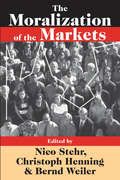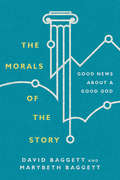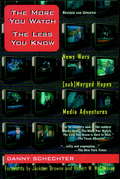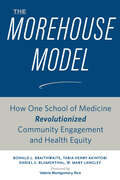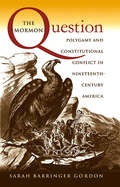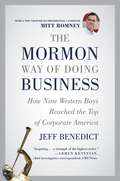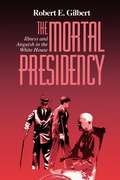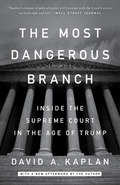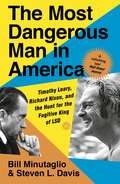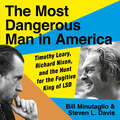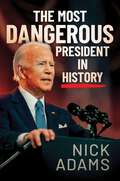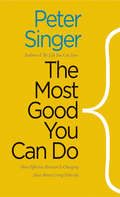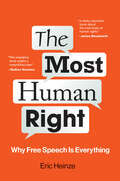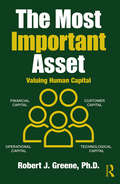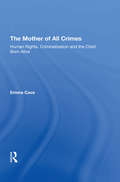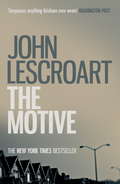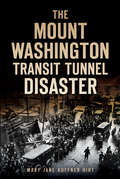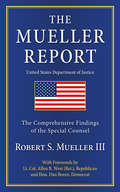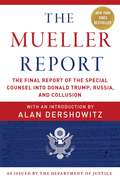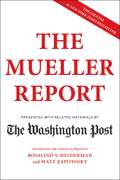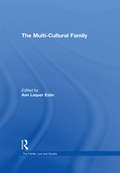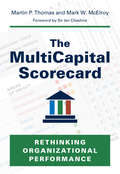- Table View
- List View
The Moralization of the Markets
by Nico Stehr Christoph Henning Bernd WeilerNothing affects the modern economy (and society) more than decisions made in the market place, especially, but not only, decisions made by consumers. Although it is not startling to suggest that decisions made in production are affected by choices consumers make, consumers have long been viewed, not only by academic economists, as individual, isolated rational actors that make or refrain from purchases purely on the basis of narrow financial considerations. Markets are not and never were morally neutral. Market relations have always had an often taken-for-granted moral underpinning. The moralization of the markets refers to the dissolution and replacement of the conventional moral underpinnings of market conduct, for example, in the music market, financial markets, and corporate governance. It further implies not only the heightened importance of new ethical precepts, but the significant change in the role of moral ideals in market behavior. These profound transformations of economic conduct are accompanied and co-determined by societal conflicts. The moralization of markets represents thus a new stage in the social evolution of markets. The book is divided into four parts, in which the twelve chapters, written by contributors from different social science disciplines, deal with the context of the moralization of the markets; the major social institutions; and present case studies that examine European and American attitudes and behavior towards tobacco and GMO; expansion of the private and ethics in business; and how workers respond to the new corporate norms. This volume will be of interest to sociologists, economists, social scientists, and the general consumer alike.
The Morals of the Story: Good News About a Good God
by David Baggett Marybeth BaggettChristianity Today
The More You Watch the Less You Know
by Robert Mcchesney Danny Schechter Jackson BrowneA candid insider's tale of how the media really works and why it doesn't work the way it should, The More You Watch, The Less You Know has emerged as a key catalyst in the debate on media reform. The More You Watch, The Less You Know recounts Schechter's media adventures, from when he was "Danny Schechter the News Dissector" on Boston's WBCN radio, to his stints as a producer at ABC's 20/20 and CNN, to his personal odyssey chronicling the anti-Apartheid revolution in South Africa, to his development of innovative programming like South Africa Now and Rights & Wrongs as an independent producer. In this age of telecommunications bills and media mergers, The More You Watch, The Less You Know is an insider's passionate plea for freedom of the (electronic) press.
The Morehouse Model: How One School of Medicine Revolutionized Community Engagement and Health Equity
by Ronald L. Braithwaite Tabia Henry Akintobi Daniel S. Blumenthal W. Mary LangleyHow can the example of Morehouse School of Medicine help other health-oriented universities create ideal collaborations between faculty and community-based organizations?Among the 154 medical schools in the United States, Morehouse School of Medicine stands out for its formidable success in improving its surrounding communities. Over its history, Morehouse has become known as an institution committed to community engagement with an interest in closing the health equity gap between people of color and the white majority population. In The Morehouse Model, Ronald L. Braithwaite and his coauthors reveal the lessons learned over the decades since the school's founding—lessons that other medical schools and health systems will be eager to learn in the hope of replicating Morehouse's success. Describing the philosophical, cultural, and contextual grounding of the Morehouse Model, they give concrete examples of it in action before explaining how to foster the collaboration between community-based organizations and university faculty that is essential to making this model of care and research work. Arguing that establishing ongoing collaborative projects requires genuineness, transparency, and trust from everyone involved, the authors offer a theory of citizen participation as a critical element for facilitating behavioral change. Drawing on case studies, exploratory research, surveys, interventions, and secondary analysis, they extrapolate lessons to advance the field of community-based participatory research alongside community health.Written by well-respected leaders in the effort to reduce health inequities, The Morehouse Model is rooted in social action and social justice constructs. It will be a touchstone for anyone conducting community-based participatory research, as well as any institution that wants to have a positive effect on its local community.
The Mormon Question
by Sarah Barringer GordonFrom the Mormon Church's public announcement of its sanction of polygamy in 1852 until its formal decision to abandon the practice in 1890, people on both sides of the "Mormon question" debated central questions of constitutional law. Did principles of religious freedom and local self-government protect Mormons' claim to a distinct, religiously based legal order? Or was polygamy, as its opponents claimed, a new form of slavery--this time for white women in Utah? And did constitutional principles dictate that democracy and true liberty were founded on separation of church and state? As Sarah Barringer Gordon shows, the answers to these questions finally yielded an apparent victory for antipolygamists in the late nineteenth century, but only after decades of argument, litigation, and open conflict. Victory came at a price; as attention and national resources poured into Utah in the late 1870s and 1880s, antipolygamists turned more and more to coercion and punishment in the name of freedom. They also left a legacy in constitutional law and political theory that still governs our treatment of religious life: Americans are free to believe, but they may well not be free to act on their beliefs.
The Mormon Way of Doing Business: How Nine Western Boys Reached the Top of Corporate America
by Jeff BenedictThe Founder of JetBlue. The former CEO of Dell Computers. The CEO of Deloitte & Touche. The former Dean of the Harvard Business School. They all have one thing in common. They are devout Mormons who spend their Sundays exclusively with their families, never work long hours, and always put their spouses and children first. How do they do it? Critically acclaimed author and investigative journalist Jeff Benedict (a Mormon himself) examines these highly successful business execs and discovers how their beliefs have influenced them, and enabled them to achieve incredible success.With original interviews and unparalleled access, Benedict shares what truly drives these individuals, and the invaluable life lessons from which anyone can benefit.
The Mortal Presidency: Illness and Anguish in the White House
by Robert E. GilbertAvailable in a new digital edition with reflowable text suitable for e-readersThe presidency is hazardous to your health. Fully two-thirds of our presidents have died before reaching their life-expectancy- despite being wealthier, better educated, and better cared for that most Americans. In Mortal Presidency, the first complete account of death and illness in the White House, Robert E. Gilbert looks at modern presidents including Coolidge, FDR, Eisenhower, Kennedy, and Reagan. He shows- in some cases, for the first time- that all suffered from debilitating medical problems, physical and/or psychological, which they frequently managed to conceal from the public but which, in important ways, affected their political lives. This edition is updated to include a brief look at Presidents Clinton and Bush, both of whom suffered sudden and unpleasant indispositions while in office which to some degree affected their presidencies.
The Most Dangerous Branch: Inside the Supreme Court's Assault on the Constitution
by David A. KaplanIn the bestselling tradition of The Nine and The Brethren, The Most Dangerous Branch takes us inside the secret world of the Supreme Court. David A. Kaplan, the former legal affairs editor of Newsweek, shows how the justices subvert the role of the other branches of government—and how we’ve come to accept it at our peril. With the retirement of Justice Anthony Kennedy, the Court has never before been more central in American life. It is the nine justices who too often now decide the controversial issues of our time—from abortion and same-sex marriage, to gun control, campaign finance and voting rights. The Court is so crucial that many voters in 2016 made their choice based on whom they thought their presidential candidate would name to the Court. Donald Trump picked Neil Gorsuch—the key decision of his new administration. The next justice—replacing Anthony Kennedy—will be even more important, holding the swing vote over so much social policy. Is that really how democracy is supposed to work? Based on exclusive interviews with the justices and dozens of their law clerks, Kaplan provides fresh details about life behind the scenes at the Court – Clarence Thomas’s simmering rage, Antonin Scalia’s death, Ruth Bader Ginsburg’s celebrity, Breyer Bingo, the petty feuding between Gorsuch and the chief justice, and what John Roberts thinks of his critics. Kaplan presents a sweeping narrative of the justices’ aggrandizement of power over the decades – from Roe v. Wade to Bush v. Gore to Citizens United, to rulings during the 2017-18 term. But the arrogance of the Court isn’t partisan: Conservative and liberal justices alike are guilty of overreach. Challenging conventional wisdom about the Court’s transcendent power, The Most Dangerous Branch is sure to rile both sides of the political aisle.
The Most Dangerous Man in America: Timothy Leary, Richard Nixon and the Hunt for the Fugitive King of LSD
by Bill Minutaglio Steven L. Davis'It's a rollicking tale that brings to life the antic atmosphere of America in the 'Me' Decade' Wall Street Journal'A madcap chase... this is a well-written chronicle of 28 months when the world went slightly mad' Sunday Times'A suitably head-spinning account of LSD High Priest Dr Timothy Leary' Mail on SundayOn the moonlit evening of September 12, 1970, an ex-Harvard professor with a genius IQ studies a twelve-foot high fence topped with barbed wire. A few months earlier, Dr. Timothy Leary, the High Priest of LSD, had been running a gleeful campaign for California governor against Ronald Reagan. Now, Leary is six months into a ten-year prison sentence for the crime of possessing two marijuana cigarettes.Aided by the radical Weather Underground, Leary's escape from prison is the counterculture's union of "dope and dynamite," aimed at sparking a revolution and overthrowing the government. Inside the Oval Office, President Richard Nixon drinks his way through sleepless nights as he expands the war in Vietnam and plots to unleash the United States government against his ever-expanding list of domestic enemies. Antiwar demonstrators are massing by the tens of thousands; homemade bombs are exploding everywhere; Black Panther leaders are threatening to burn down the White House; and all the while Nixon obsesses over tracking down Timothy Leary, whom he has branded "the most dangerous man in America."Based on freshly uncovered primary sources and new firsthand interviews, THE MOST DANGEROUS MAN IN AMERICA is an American thriller that takes readers along for the gonzo ride of a lifetime. Spanning twenty-eight months, President Nixon's careening, global manhunt for Dr. Timothy Leary winds its way among homegrown radicals, European aristocrats, a Black Panther outpost in Algeria, an international arms dealer, hash-smuggling hippies from the Brotherhood of Eternal Love, and secret agents on four continents, culminating in one of the trippiest journeys through the American counterculture.
The Most Dangerous Man in America: Timothy Leary, Richard Nixon and the Hunt for the Fugitive King of LSD
by Bill Minutaglio Steven L. Davis'It's a rollicking tale that brings to life the antic atmosphere of America in the 'Me' Decade' Wall Street Journal'A madcap chase... this is a well-written chronicle of 28 months when the world went slightly mad' Sunday TimesFrom Bill Minutaglio and Steven L. Davis, authors of the PEN Center USA award-winning Dallas 1963, comes a madcap narrative about Timothy Leary's daring prison escape and run from the law.On the moonlit evening of September 12, 1970, an ex-Harvard professor with a genius IQ studies a twelve-foot high fence topped with barbed wire. A few months earlier, Dr. Timothy Leary, the High Priest of LSD, had been running a gleeful campaign for California governor against Ronald Reagan. Now, Leary is six months into a ten-year prison sentence for the crime of possessing two marijuana cigarettes.Aided by the radical Weather Underground, Leary's escape from prison is the counterculture's union of "dope and dynamite," aimed at sparking a revolution and overthrowing the government. Inside the Oval Office, President Richard Nixon drinks his way through sleepless nights as he expands the war in Vietnam and plots to unleash the United States government against his ever-expanding list of domestic enemies. Antiwar demonstrators are massing by the tens of thousands; homemade bombs are exploding everywhere; Black Panther leaders are threatening to burn down the White House; and all the while Nixon obsesses over tracking down Timothy Leary, whom he has branded "the most dangerous man in America."Based on freshly uncovered primary sources and new firsthand interviews, THE MOST DANGEROUS MAN IN AMERICA is an American thriller that takes readers along for the gonzo ride of a lifetime. Spanning twenty-eight months, President Nixon's careening, global manhunt for Dr. Timothy Leary winds its way among homegrown radicals, European aristocrats, a Black Panther outpost in Algeria, an international arms dealer, hash-smuggling hippies from the Brotherhood of Eternal Love, and secret agents on four continents, culminating in one of the trippiest journeys through the American counterculture.(P)2018 Hachette Audio
The Most Dangerous Man in the World: Julian Assange and His Secret White House Deal for Freedom
by Andrew FowlerIn June 2024, after fourteen years of house arrest and incarceration, Julian Assange, the Australian journalist the CIA had planned to kidnap or kill, was finally released from the UK&’s top security Belmarsh prison. Years of campaigning by his family and Australian politicians from across the political spectrum had finally paid off: Assange&’s plea bargain with the US Department of Justice produced the legal deal of the century. Instead of serving a possible 175-year jail sentence, Assange walked free. What changed former US President Joe Biden&’s mind after years of appeals and hearings? When WikiLeaks revealed evidence of American war crimes in Iraq, Biden had called Assange a &‘high tech terrorist&’. Why did Biden now believe the time was right to end the pursuit and to cut a deal? Andrew Fowler takes us inside the negotiations with the White House, revealing a startling story of false hope, courage, resolve and the extraordinary resilience of the person Pentagon Papers whistleblower Daniel Ellsberg called the Most Dangerous Man in the World.
The Most Dangerous President in History
by Nick AdamsPresident Biden is the most dangerous president in American history.Many Americans still think of Joe Biden as an average guy who supports the working class. But in reality, he has carried out a destructive agenda against our entire system of freedom. He has fully embraced the Green New Deal agenda, along with woke sexual and racial politics, leading to a more divided and poorer country. His weakness on the international stage has created a perilous world. But the danger of Biden goes much deeper than these issues that are hurting us on a daily basis. For one of the first times in US history, we have a president whose motives we cannot trust. In this book, Nick Adams exposes what the media and politicians have been hiding for nearly fifty years. He doesn&’t just make the case that Biden is the most dangerous president in history—he proves it.
The Most Fundamental Right
by Daniel MccoolPassed in 1965 during the height of the Civil Rights movement, the Voting Rights Act (VRA) changed the face of the American electorate, dramatically increasing minority voting, especially in the South. While portions of the Act are permanent, certain provisions were set to expire in 2007. Reauthorization of these provisions passed by a wide margin in the House, and unanimously in the Senate, but the lopsided tally hid a deep and growing conflict. The Most Fundamental Right is an effort to understand the debate over the Act and its role in contemporary American democracy. Is the VRA the cornerstone of civil rights law that prevents unfair voting practices, or is it an anachronism that no longer serves American democracy? Divided into three sections, the book utilizes a point/counterpoint approach. Section 1 explains the legal and political context of the Act, providing important background for what follows; Section 2 pairs three debates concerning specific provisions or applications of the Act; while Section 3 offers commentaries on the previous chapters from attorneys with widely divergent viewpoints.
The Most Good You Can Do: How Effective Altruism Is Changing Ideas About Living Ethically (Castle Lectures Ser.)
by Peter SingerAn argument for putting sentiment aside and maximizing the practical impact of our donated dollars: &“Powerful, provocative&” (Nicholas Kristof, The New York Times). Peter Singer&’s books and ideas have been disturbing our complacency ever since the appearance of Animal Liberation. Now he directs our attention to a challenging new movement in which his own ideas have played a crucial role: effective altruism. Effective altruism is built upon the simple but profoundly unsettling idea that living a fully ethical life involves doing the &“most good you can do.&” Such a life requires a rigorously unsentimental view of charitable giving: to be a worthy recipient of our support, an organization must be able to demonstrate that it will do more good with our money or our time than other options open to us. Singer introduces us to an array of remarkable people who are restructuring their lives in accordance with these ideas, and shows how, paradoxically, living altruistically often leads to greater personal fulfillment than living for oneself. Doing the Most Good develops the challenges Singer has made, in the New York Times and Washington Post, to those who donate to the arts, and to charities focused on helping our fellow citizens, rather than those for whom we can do the most good. Effective altruists are extending our knowledge of the possibilities of living less selfishly, and of allowing reason, rather than emotion, to determine how we live. Doing the Most Good offers new hope for our ability to tackle the world&’s most pressing problems.
The Most Human Right: Why Free Speech Is Everything
by Eric HeinzeA bold, groundbreaking argument by a world-renowned expert that unless we treat free speech as the fundamental human right, there can be no others. What are human rights? Are they laid out definitively in the UN&’s Universal Declaration of Human Rights or the US Bill of Rights? Are they items on a checklist—dignity, justice, progress, standard of living, health care, housing? In The Most Human Right, Eric Heinze explains why global human rights systems have failed. International organizations constantly report on how governments manage human goods, such as fair trials, humane conditions of detention, healthcare, or housing. But to appease autocratic regimes, experts have ignored the primacy of free speech. Heinze argues that goods become rights only when citizens can claim them publicly and fearlessly: free speech is the fundamental right, without which the very concept of a &“right&” makes no sense. Heinze argues that throughout history countless systems of justice have promised human goods. What, then, makes human rights different? What must human rights have that other systems have lacked? Heinze revisits the origins of the concept, exploring what it means for a nation to protect human rights, and what a citizen needs in order to pursue them. He explains how free speech distinguishes human rights from other ideas about justice, past and present.
The Most Important Asset: Valuing Human Capital
by Robert GreeneThe principles of sound human resource management are generally understood, but too often practitioners believe the same policies and programs will work in all contexts. The effectiveness of any system is highly dependent on the context within which it must function. And due to globalization and increased workforce diversity, the contexts across and even within organizations have become more varied.The Most Important Asset is a story about new graduates entering the human resources field, encountering and dealing with workforce management challenges and issues and developing their own professional competence through experience. Principles are presented and alternative solutions to problems are explored, providing the reader with a roadmap for analyzing situations and making decisions as to how to act. Placing the characters in different types of organizations provides insights into how different contexts call for different strategies. Alternative strategies for staffing an organization, developing its people, defining, measuring and rewarding performance are used to illustrate how what is done should be compatible with the mission, culture, organizational strategy, and internal and external realities.
The Most Wanted
by Jacquelyn MitchardArley, a 14-year-old honor student in Texas, begins writing to Dillon LeGrande, an inmate of the nearby correctional facility. Gradually, she falls in love with him, and they are secretly married. When she becomes pregnant, she is rejected by her family and moves in with an activist lawyer, a woman who is having troubles with her boyfriend, a death row attorney.…
The Mother of All Crimes: Human Rights, Criminalization and the Child Born Alive
by Emma CaveThis book considers the appropriate response of the criminal law with regard to women whose acts or omissions in pregnancy cause the death or injury of the child born alive. It compares recent developments in English law in the light of the Human Rights Act 1998, with those in America, which has seen an enormous growth in litigation over the last two decades. In England and Wales, the 'born alive rule' is currently applied only to third parties who injure the fetus, which is later born alive and dies as a result of these injuries. In some American states, a rule of similar origins has been extended so as to criminalize recent mothers whose acts or omissions in pregnancy caused injury or death to the resulting child. The author examines the implications of the laws in both systems, and also looks at the rights of the mother and child in relation to the obligations of the state to protect both of them.
The Motive: A gripping murder mystery in the city of San Francisco (Dismas Hardy)
by John LescroartDismas Hardy and Abe Glitsky seek answers for San Francisco's mayor, in this gripping murder mystery. The Motive is the eleventh book in John Lescoart's Dismas Hardy series and is perfect for fans of Scott Turow and Deborah Hawkins.'Surpasses anything Grisham ever wrote and bears comparison with Turow' - Washington PostIt starts with a double homicide. Because of the high profiles of the victims, the mayor of San Francisco herself demands that a high-ranking detective be put on the case. And so Abe Glitsky is thrust into the controversial investigation. Dan Cuneo, the officer on the case, is immediately wary of Glitsky and doesn't hide his distrust. Matters are made worse when Cuneo starts to focus on his primary suspect - an old girlfriend of Dismas Hardy. Convinced that Hardy's client is the wrong suspect, Glitsky breaks ranks within the police department to continue his own investigation. As Hardy's murder trial builds to its stunning conclusion, Glitsky's search for the truth does more than fuel suspicion against the two men. It reveals a trail of deception that leads beyond San Francisco, where exposing desperate secrets can be the most deadly offence.What readers are saying about The Motive:'Seamless writing''A great 'whodunit' and a terrific courtroom drama all rolled into one''Engrossing to the very last page'
The Mount Washington Transit Tunnel Disaster (Disaster)
by Mary Jane HirtOn Christmas Eve 1917, an overcrowded, out-of-control streetcar exited the Mount Washington tunnel, crashing into pedestrians. Twenty-three were killed and more than eighty injured in the worst transit incident in Pittsburgh history. The crash scene on Carson Street was chaotic as physicians turned the railway offices into a makeshift hospital and bystanders frantically sought to remove the injured and strewn bodies from the wreckage. Most of the victims, many women and children, were from the close-knit neighborhoods of Knoxville, Beltzhoover and Mount Oliver. In the aftermath, public outrage over the tragedy led to criminal prosecution, civil suits and the bankruptcy of the Pittsburgh Railways Company, which operated the service. Author Mary Jane Kuffner Hirt explores the tragic history of the Mount Washington transit tunnel disaster.
The Mueller Report: The Comprehensive Findings of the Special Counsel
by Robert S. Mueller IIIThe historic report on the investigation into Russian interference in the 2016 presidential election—with forewords by two former congressmen. In the future, The Mueller Report may be judged as the most important document of our time. And no matter where you reside on the American political spectrum, you will probably agree that it will have far-reaching implications for the balance of power among the three coequal branches of government that create, administer, and apply the laws of our republic. This edition includes forewords by Lt. Col. Allen B. West (Ret.), and the Hon. Dan Boren, both former US congressmen. Having served on opposite sides of the aisle while Robert Mueller served as director of the FBI, they hold insight into the leadership of the organization created expressly to investigate the questions answered by this report.
The Mueller Report: The Final Report of the Special Counsel into Donald Trump, Russia, and Collusion
by Robert S. Mueller III Special Counsel's U.S. Department of JusticeThere has never been a more important political investigation than Robert S. Mueller III's into President Donald Trump's possible collusion with Russia. His momentous findings can be found here, complete with: <br>The 300+ pages of the historic report, as released by the Justice Department <br>An introduction by constitutional scholar, eminent civil libertarian, and New York Times bestselling author Alan Dershowitz. <P><P>The relevant portions of Title 28 of the Code of Federal Regulations, the 1999 provisions written by former acting Solicitor General Neal Katyal, which establish and regulate the powers of the special counsel. <P><P>Rod Rosenstein’s 2016 order appointing Robert Mueller III as special counsel and outlining the scope of his investigation. <P><P>Attorney General William Barr’s four-page summary of the report, as sent to Congress. <P><P>Barr's explanation of the four reasons for redacting the report, and a key for identifying them in the color-coded report <P><P>The wait is over. Robert Mueller, a lifelong Republican, has concluded his investigation and submitted its findings to Attorney General William Barr. Barr has told Congress that Mueller found no proof of collusion between the Trump campaign and Russia, and did not come to a conclusion on obstruction of justice—neither concluding the president committed a crime nor exonerating him. But Mueller’s report was over 300 pages and Barr’s summary was only four pages, raising questions about the conclusions of a historic investigation. <P><P>Special Counsel Robert Mueller III’s probe into Russian influence on the 2016 election of Donald Trump—including links between the campaign and Russian interests, obstruction of justice by President Trump, and any other matters that may have arisen in the course of the investigation—has been the focal point of American politics since its inception in May 2017. Democrats in the US House of Representatives hoped to use the report to begin impeachment proceedings, with the support of those critical of the president. Media tracked Mueller’s every move, and the investigation was subject to constant speculation by political pundits everywhere. It resulted in the indictments of Michael Flynn, Paul Manafort, Roger Stone, and many others. President Trump and his supporters affirmed that the investigation was a “witch hunt” and the product of a plot by the political establishment—the “deep state”—to delegitimize his presidency. <P><P> Mueller’s findings—at least according to Barr—allowed the latter to claim victory. But now, thanks to a subpoena from House Judiciary Committee chairman Jerry Nadler for the full report, a resolution from the House of Representatives to release the full report to the public (though blocked in the Senate by Mitch McConnell), and popular demand, it’s time for public to judge if that is true. The Mueller investigation will join Watergate, and the Mueller Report will join the 9/11 Commission Report, the Warren Report, and the Starr Report, as one of the most important in history. The Mueller Report is required reading for everyone with interest in American politics, for every 2016 and 2020 voter, and every American. It’s now available here as an affordable paperback, featuring an introduction from eminent civil libertarian, Harvard Law Professor Emeritus, and New York Times bestselling author Alan Dershowitz, who provides a constitutional, civil law-based commentary sorely needed in today’s media landscape. <P><b>A New York Times Bestseller</b>
The Mueller Report: The Full Report On The Investigation Into Russian Interference In The 2016 Presidential Election
by The Washington PostONE OF TIME&’S 100 BEST BOOKS OF THE YEAR The Crucial #1 New York Times Bestseller &“The Mueller report is that rare Washington tell-all that surpasses its pre-publication hype…the best book by far on the workings of the Trump presidency.&” —Carlos Lozada, The Washington Post The only book with exclusive analysis by the Pulitzer Prize–winning staff of The Washington Post, and the most complete and authoritative available.Read the findings of the Special Counsel&’s investigation into Russian interference in the 2016 election, complete with accompanying analysis by the Post reporters who&’ve covered the story from the beginning. This edition from The Washington Post/Scribner contains: —The long-awaited Report On The Investigation Into Russian Interference In The 2016 Presidential Election —An introduction by The Washington Post titled &“A President, a Prosecutor, and the Protection of American Democracy&” —A timeline of the major events of the Special Counsel&’s investigation from May 2017, when Robert Mueller was appointed, to the report's delivery —A guide to individuals involved, including in the Special Counsel&’s Office, the Department of Justice, the FBI, the Trump Campaign, the White House, the Trump legal defense team, and the Russians —Key documents in the Special Counsel&’s investigation, including filings pertaining to General Michael T. Flynn, Paul Manafort, Michael Cohen, Roger Stone, and the Russian internet operation in St. Petersburg. Each document is introduced and explained by Washington Post reporters. One of the most urgent and important investigations ever conducted, the Mueller inquiry focuses on Donald Trump, his presidential campaign, and Russian interference in the 2016 election, and draws on the testimony of dozens of witnesses and the work of some of the country&’s most seasoned prosecutors. The special counsel&’s investigation looms as a turning point in American history. The Mueller Report is essential reading for all citizens concerned about the fate of the presidency and the future of our democracy.
The Multi-Cultural Family (The Family, Law and Society)
by Ann Laquer EstinWith the accelerating movement of individuals and families across national borders, the intersections of cultural and legal frameworks have become increasingly complex. The Multi-Cultural Family collects essays from around the world on the challenges of legal pluralism, minority religious communities and customary or indigenous law, with attention paid to marriage and divorce, as well as child custody and adoption, family violence and dispute resolution.
The MultiCapital Scorecard: Rethinking Organizational Performance
by Mark W. Mcelroy Martin P. ThomasFor decades now, organizations have been struggling to find the best way to address their social and environmental responsibilities alongside their economic obligations. In other words, they want to know how best to effectively manage their operations based on a triple bottom line (3BL)--one that reflects social, environmental, and economic performance. Recently, an international standard for integrated reporting has emerged that in principle emphasizes the importance of managing toward a triple bottom line. But it fails to provide specific guidance on how to do so. Organizations have been left to their own devices to respond. How should 3BL management actually be done? In this book, sustainability and performance experts Martin Thomas and Mark McElroy introduce the world's most advanced 3BL performance accounting methodology: The MultiCapital Scorecard. It is the first context-based integrated measurement, management, and reporting system. And, it can help corporations, public institutions, and other organizations answer the question they should be asking themselves for every aspect of their operations: "How much is enough for us to be sustainable?" The answers set internal performance standards against which operations and their impacts can be measured. Nothing less will do! The MultiCapital Scorecard describes this open-source methodology, which consists of a structured, quantitative measurement and reporting system that complies with international standards for 3BL integrated measurement and reporting. Moreover, the MultiCapital Scorecard is designed to help organizations assess their own 3BL performance in their own contexts with context-based metrics of their own choosing. An eminently practical management aid for integrated thinking, it can be tailored to any organization's needs. The authors also describe how and why businesses are gradually shifting from managing impacts on only one type of capital (economic) to managing impacts on multiple types. They also provide detailed examples of worked reports, showing how organizations might develop and quantify the interim and long-term goals to meet their obligations to their employees, community, shareholders, and the environment. The examples also show how an organization can use the Multicapital Scorecard methodology to assess their progress in meeting those goals, and convey that progress to their stakeholders.
